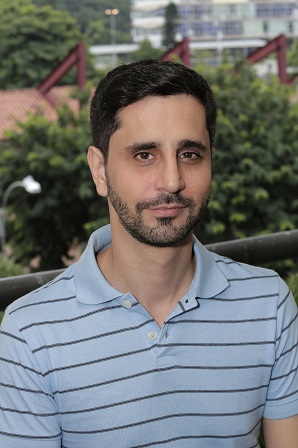Mário Sérgio Alvim

Research areas: Degrees:
Doutorado, École Polytechnique, França, 201
Phone: 5845
msalvim@dcc.ufmg.br
 Home page
Home page
 Lattes
Lattes
 Google scholar
Google scholar Information extracted from Lattes platform
Last update: 2023/07/25ORCID: https://orcid.org/0000-0002-4196-7467
Current projects
| 2023 a Atual | Hypathia - A formal model for interpreting privacy as resistance to inferences We want to derive a formal model in the framework of quantitative information flow (QIF) to characterize the relationship between privacy and utility satisfying the following constraints. (1) The model must support reasoning about sanitization by local differential privacy (LDP). (2) The model must characterize privacy in terms of practical concerns including: (i) membership-inference, in which the goal is to infer whether an individual?s data is present in a collection; (ii) re- identification, in which the goal is to infer the individual to whom a particular piece of data refers; and (iii) attribute-inference, in which the goal is to infer an individual?s sensitive attribute, irrespectively of whether that individual has been re-identified. (3) The model must be explainable to policy-makers and the general public, indicating the resistance to each type of inference in a given scenario. (4) The model must characterize the trade-off between privacy and the utility in a data release. Integrantes: Mário Sérgio Ferreira Alvim Júnior (coordenador). |
| 2017 a Atual | Uma ferramenta para cálculo de métricas de fluxo de informação quantitativo Este projeto tem como tema a aplicação de métodos formais para a definição de propriedades de segurança de sistemas computacionais, assim como a quantificação dessas propriedades. Nossa proposta é formalizar o uso de duas novas dimensões nas métricas de QIF: custo e benefício. O adversário é guiado por suas restrições de custo, como de qual poder computacional ele dispõe, quais políticas o guiam, ou quais leis e punições ele está disposto a seguir ou infringir. Já o protetor tenta guardar o segredo de acordo com seu benefício: a forma como o segredo se divide em estruturas, qual o valor relativo de cada estrutura, e como cada estrutura pode revelar informação a respeito de outra. Integrantes: Mário Sérgio Ferreira Alvim Júnior (coordenador). |
| 2015 a Atual | Medindo a segurança de sistemas interativos dinâmicos: Avançando técnicas de fluxo de informação quantitativo O objetivo principal do projeto é avançar as técnicas disponiveis para a análise formal da segurança de sistemas computacionais interativos que computem utilizando segredos dinâmicos, aperfeiçoando metodologias de fluxo de informação quantitativo existentes e aplicando-as a sistemas reais. Integrantes: Mário Sérgio Ferreira Alvim Júnior (coordenador). |
| 2014 a Atual | Context-QIF: Um arcabouço formal para fluxo de informação quantitativo baseado em contexto Projeto de cunho científico cujo objetivo principal é desenvolver um framework formal para fluxo de informação quantitativo que modele o contexto de execução de sistemas computacionais e capture: (i) a rigorosidade das garantias baseadas em teoria da informação, (ii) o benefício que guia o designer do sistema a esconder parte da informação, e (iii) o custo que guia o adversário a atacar o sistema. Integrantes: Mário Sérgio Ferreira Alvim Júnior (coordenador). |
Current applied research projects
Recent publications
Articles in journals
A Formal Model for Polarization under Confirmation Bias in Social Networks2023. Logical Methods in Computer Science.
How to build high quality L2R training data: Unsupervised compression-based selective sampling for learning to rank
2022. INFORMATION SCIENCES.
Flexible and scalable privacy assessment for very large datasets, with an application to official governmental microdata
2022. Proceedings on Privacy Enhancing Technologies.
A novel reconstruction attack on foreign-trade official statistics, with a Brazilian case study
2022. Proceedings on Privacy Enhancing Technologies.
Information Leakage Games: Exploring Information as a Utility Function
2022. ACM Transactions on Privacy and Security.
The Impact of Stationarity, Regularity, and Context on the Predictability of Individual Human Mobility
2021. ACM TRANSACTIONS ON SPATIAL ALGORITHMS AND SYSTEMS.
 An Axiomatization of Information Flow Measures
An Axiomatization of Information Flow Measures2018. THEORETICAL COMPUTER SCIENCE.
Papers in conferences
 A novel analysis of utility in privacy pipelines, using Kronecker products and quantitative information flow
A novel analysis of utility in privacy pipelines, using Kronecker products and quantitative information flow2023. 30th ACM Conference on Computer and Communications Security (CCS 2023).
A Multi-agent Model for Polarization Under Confirmation Bias in Social Networks
2021. 41st IFIP International Conference on Formal Techniques for Distributed Objects, Components, and Systems (FORTE 2021).
On Privacy and Accuracy in Data Releases (Invited Paper)
2020. 31st International Conference on Concurrency Theory (CONCUR 2020). 1
Brazildam: A Benchmark Dataset For Tailings Dam Detection
2020. 2020 IEEE Latin American GRSS & ISPRS Remote Sensing Conference (LAGIRS). 2
A Probabilistic Algorithm to Predict Missing Facts from Knowledge Graphs
2019. 30th International Conference on Database and Expert Systems Applications (DEXA 2019). 3
Deciphering Predictability Limits in Human Mobility
2019. the 27th ACM SIGSPATIAL International Conference. 4
 Quantifying Information Flow for Dynamic Secrets
Quantifying Information Flow for Dynamic Secrets2014. 35th IEEE Symposium on Security and Privacy.
 Additive and multiplicative notions of leakage, and their capacities
Additive and multiplicative notions of leakage, and their capacities2014. 27th IEEE Computer Security Foundations Symposium.
Extended abstracts in conferences
Analyzing the Shuffle Model through the Lens of Quantitative Information Flow2023. 36th IEEE Computer Security Foundations Symposium (CSF 2023).
On the Duality of Privacy and Fairness (Extended Abstract)
2023. 9th International Conference on AI and the Digital Economy (CADE 2023).
Modeling Information Flow in Dynamic Information Retrieval
2017. the ACM SIGIR International Conference.
Proof-Carrying Sensing
2017. the 15th ACM Conference.
Probabilistic Information Flow
2010. 2010 25th Annual IEEE Symposium on Logic in Computer Science (LICS 2010).
Abstracts in conferences
Quantificando Vazamento de Informação sobre Estratégias2016. 1o Encontro de Teoria da Computação.
Not all bits are created equal: incorporating the meaning and value of secret bits into measures of information flow
2012. Quantitative Security Analysis (Dagstuhl Seminar 12481).
Measuring Information Leakage using Generalized Gain Functions (Abstract)
2012. Quantitative Security Analysis (Dagstuhl Seminar 12481).
Entropy and Attack Models in Information Flow
2010. Theoretical Computer Science.
See all publications in Lattes
Current students
MS
Bruno Demattos Nogueira. On the connection between quantitative information flow and fairness in machine learning. Início: 2021. Universidade Federal de Minas Gerais (Orientador principal)PhD
Ramon Gonçalves Gonze. A QIF model for the relationship between membership, re-identification, and attribute-inference attacks. Início: 2023. Universidade Federal de Minas Gerais (Orientador principal)Luigi Domenico Cecchini Soares. Formal Methods for Privacy and Utility in Large Datasets. Início: 2022. Universidade Federal de Minas Gerais (Orientador principal)
Gleison Souza Diniz Mendonça. Quantitative information flow approaches to statistical disclosure control. Início: 2021. Universidade Federal de Minas Gerais (Orientador principal)
Gabriel Henrique Lopes Gomes Alves Nunes. Formal Methods for Privacy and Fairness. Início: 2021. Universidade Federal de Minas Gerais (Orientador principal)
See all students in Lattes
